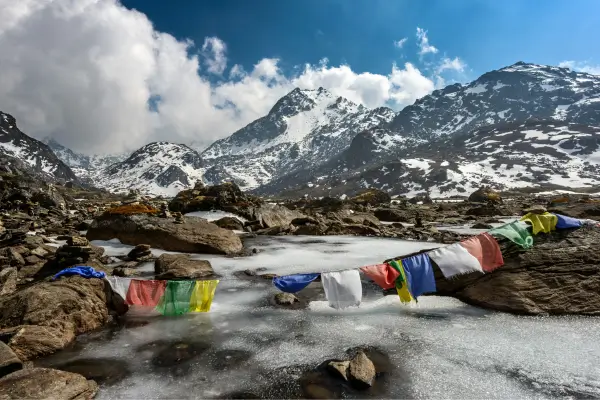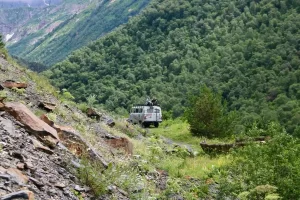In a world where travelers are increasingly mindful of their environmental footprint, ecotourism has emerged as a leading way to explore the planet while giving back to the ecosystems that sustain it. Unlike traditional tourism, which often prioritizes convenience over conservation, ecotourism focuses on preserving natural landscapes, supporting local communities, and promoting environmental awareness. As more people seek ways to balance their sense of adventure with a commitment to sustainability, environmentally conscious travel has become more than a trend—it’s a necessity.
Exploring nature’s wildest landscapes doesn’t have to come at the cost of its preservation. From dense rainforests and towering mountain ranges to remote deserts and vibrant coral reefs, the wild side of nature offers unmatched beauty and thrills. But the key is to experience it responsibly. By embracing eco-friendly practices, travelers can embark on exciting adventures while ensuring that the environment remains intact for future generations.
In this guide, we’ll dive into some of the best ecotourism adventures around the globe, perfect for those who want to experience the raw, untamed wilderness while treading lightly on the earth. Whether you’re zip-lining through the rainforest, trekking across rugged terrains, or diving deep into marine ecosystems, these adventures will inspire both adrenaline and environmental stewardship.
The Importance of Ecotourism for Conservation
Ecotourism is more than just a travel choice—it’s a movement that plays a critical role in preserving the delicate balance of our planet’s ecosystems. By choosing destinations and experiences that prioritize sustainability, travelers contribute directly to the protection of endangered habitats, wildlife, and local cultures. Unlike mass tourism, which often strains natural resources and disrupts environments, ecotourism seeks to create a harmonious relationship between people and nature.
One of the core benefits of ecotourism is its ability to fund conservation efforts. Many ecotourism operators partner with conservation organizations or contribute a portion of their profits to preserving the very landscapes travelers come to experience. In places like Costa Rica’s rainforests or Namibia’s deserts, ecotourism has helped restore damaged ecosystems, protect biodiversity, and support wildlife rehabilitation. It also plays a vital role in educating travelers about the importance of conservation, turning tourists into advocates for the environment.
Travelers themselves play a pivotal role in the success of ecotourism. Every choice made during a trip—from selecting eco-friendly accommodations to minimizing waste—contributes to the health of local ecosystems. The impact goes beyond the immediate environment: supporting local businesses that prioritize sustainability ensures that these practices continue to grow. It’s a ripple effect that starts with the traveler and spreads through entire communities, encouraging a sustainable approach to tourism that balances adventure with environmental responsibility.
Ecotourism also highlights the connection between adventure and sustainability. Thrilling experiences like hiking through protected national parks or diving in coral reefs come with an added layer of purpose: the knowledge that your adventure is part of a broader effort to conserve these places for future generations. By fostering an understanding of the fragility of these ecosystems, ecotourism transforms an adrenaline-filled journey into a meaningful contribution to the planet’s well-being.
Top Ecotourism Adventure Destinations
Rainforest Exploration in Costa Rica
Costa Rica is a global leader in biodiversity and sustainable tourism, making it a prime destination for eco-conscious adventurers. Home to over 5% of the world’s species, its lush rainforests are teeming with wildlife, from vibrant toucans and tree frogs to elusive jaguars and sloths. The country’s commitment to environmental protection is evident, with nearly 25% of its land designated as protected areas or national parks.
For adventure seekers, the possibilities are endless. Zip-lining through the dense canopy offers a bird’s-eye view of the forest, while guided wildlife tours allow for up-close encounters with the region’s unique fauna. Eco-lodges scattered throughout the rainforests provide sustainable accommodations, blending luxury with low-impact living. These lodges often use renewable energy, practice water conservation, and support local conservation projects, ensuring that travelers contribute to the protection of Costa Rica’s rich ecosystems while enjoying its natural beauty.
Trekking in the Himalayas (Nepal)
The towering peaks of the Himalayas have long drawn adventurers, and Nepal’s dedication to eco-conscious trekking has made it a favorite for environmentally aware travelers. Low-impact trekking routes are designed to minimize damage to the fragile mountain ecosystems, and eco-friendly accommodations such as teahouses and lodges provide sustainable options for rest along the journey.
Cultural immersion is a key aspect of trekking in Nepal, where travelers can engage with local communities and support initiatives that preserve both nature and heritage. By choosing local guides and contributing to eco-tourism programs, trekkers play a part in protecting the natural environment while fostering the region’s cultural traditions. The region’s pristine beauty—from snow-capped mountains to verdant valleys—can be enjoyed with the knowledge that these landscapes are being preserved through sustainable travel practices.
Diving in the Great Barrier Reef (Australia)
The Great Barrier Reef is one of the most awe-inspiring natural wonders on Earth, but its delicate marine ecosystems are under threat from climate change and pollution. Conservation-led diving experiences have emerged as a way for eco-conscious travelers to explore this underwater paradise while actively contributing to its preservation.
Diving tours often partner with marine conservation organizations, allowing travelers to participate in reef monitoring, coral rehabilitation efforts, and educational initiatives that raise awareness about the importance of marine preservation. These experiences emphasize the need to protect the reef’s biodiversity, from its vibrant corals to the countless species of fish, turtles, and sharks that call it home. By choosing responsible dive operators, travelers can help safeguard the future of this fragile ecosystem while enjoying one of the world’s most breathtaking diving destinations.
Desert Adventures in Namibia
Namibia’s desert landscapes, with their vast, arid beauty, offer a truly unique ecotourism experience. The country is at the forefront of conservation efforts, with a strong emphasis on protecting its fragile desert ecosystems. Eco-friendly safaris and desert treks allow travelers to explore the iconic Namib Desert, home to diverse wildlife such as oryx, desert-adapted elephants, and cheetahs.
Sustainable lodging is a cornerstone of Namibia’s tourism industry, with many eco-lodges designed to minimize water and energy consumption while blending harmoniously with the surrounding environment. These lodges often contribute to conservation projects, ensuring that tourism dollars support the protection of the desert’s unique flora and fauna. For adventurers, Namibia offers the chance to experience the raw beauty of the desert while knowing that their presence is helping to preserve this extraordinary ecosystem for future generations.
Guidelines for Environmentally Aware Travelers
As an environmentally aware traveler, your actions can make a significant difference in preserving the places you explore. From small, everyday choices to conscious travel planning, there are numerous ways to minimize your environmental impact and ensure that your adventures contribute positively to the ecosystems and communities you visit. Here are practical guidelines to follow on your next ecotourism adventure:
Choose Sustainable Travel Options
Opt for transportation methods with a lower carbon footprint, such as trains, buses, or electric vehicles, when possible. If flying is unavoidable, consider carbon offset programs offered by airlines or third-party organizations. These programs support projects like reforestation or renewable energy, helping to balance out the emissions generated by your flight.
Stay in Eco-Friendly Accommodations
Select accommodations that prioritize sustainability. Eco-lodges, green hotels, and certified eco-resorts are excellent choices, as they often use renewable energy sources, implement water and waste conservation measures, and support local conservation initiatives. Look for certifications such as LEED (Leadership in Energy and Environmental Design) or Green Key when booking your stay.
Minimize Waste
One of the simplest ways to reduce your environmental impact is by cutting down on waste. Bring reusable water bottles, bags, and containers to avoid single-use plastics. If your destination has limited recycling facilities, pack items like toiletries and snacks in reusable packaging and carry out any trash you generate. Consider packing eco-friendly products, such as biodegradable toiletries and reef-safe sunscreens, which protect sensitive marine ecosystems from harmful chemicals.
Support Local Conservation Efforts
Many ecotourism destinations have ongoing conservation projects, from wildlife rehabilitation to habitat restoration. By supporting local organizations—either through donations, volunteer work, or participation in educational tours—you can help fund these efforts. Additionally, purchasing locally made products and services supports sustainable economic development and helps reduce the need for importing goods, which often have a larger carbon footprint.
Follow Leave No Trace Principles
The Leave No Trace philosophy is central to sustainable travel. These seven principles encourage responsible outdoor behavior, ensuring that natural environments remain pristine for future generations. Key principles include:
- Dispose of Waste Properly: Carry out all trash and dispose of it in designated areas.
- Leave What You Find: Avoid disturbing natural habitats by not removing rocks, plants, or other items.
- Respect Wildlife: Observe animals from a distance, avoid feeding them, and follow local regulations regarding interactions with wildlife.
- Stick to Designated Trails: Prevent erosion and habitat destruction by staying on marked trails.
Be Mindful of Wildlife Interactions
Wildlife is one of the main attractions in many ecotourism destinations, but it’s crucial to remember that these are living creatures, not tourist attractions. Keep a respectful distance, avoid loud noises or sudden movements, and never attempt to touch or feed animals. Guided tours led by experienced local naturalists can provide deeper insights into animal behavior while ensuring that encounters remain safe and non-intrusive.
Conserve Water and Energy
In many ecotourism destinations, particularly in remote or fragile environments, resources like water and energy are limited. Help conserve them by taking shorter showers, reusing towels and linens, turning off lights when not in use, and opting for manual transportation methods like biking or walking whenever possible.
By adopting these guidelines, you can enjoy thrilling ecotourism adventures while playing an active role in protecting the planet. Every choice you make—from how you travel to where you stay—has an impact, and responsible travelers are key to ensuring that these wild, natural places remain for future generations to experience and cherish.
The Future of Ecotourism Adventures
As environmental awareness continues to grow, so does the demand for sustainable and eco-conscious travel experiences. The future of ecotourism is set to be defined by innovations that not only minimize the environmental impact of adventure tourism but also enhance the overall experience for travelers. With a new generation of eco-conscious adventurers leading the way, the global travel industry is evolving to meet the challenges of conservation and sustainability head-on.
Innovations in Sustainable Adventure Tourism
One of the most exciting aspects of the future of ecotourism is the integration of cutting-edge technology and innovative practices that help reduce the ecological footprint of adventure travel. From solar-powered eco-lodges and electric safari vehicles to biodegradable trekking gear, technological advancements are making it easier than ever for travelers to enjoy thrilling outdoor experiences without compromising the environment.
In addition, virtual and augmented reality (VR and AR) are opening new doors for remote exploration. These technologies allow travelers to experience distant, fragile ecosystems in an immersive way—whether it’s diving deep into coral reefs or hiking remote mountain ranges—without leaving a carbon footprint. While nothing can fully replace physical travel, VR and AR provide sustainable alternatives that can help alleviate the pressures on endangered environments.
Sustainable adventure travel is also expanding into new territories, with an emphasis on regenerative tourism. Unlike traditional ecotourism, which seeks to minimize harm, regenerative tourism aims to restore and improve the environment. This approach focuses on creating net-positive impacts, such as rewilding landscapes, replenishing wildlife populations, and supporting long-term conservation initiatives.
The Growing Trend of Eco-Conscious Travelers
The rise of eco-conscious travelers is not just a passing trend; it reflects a deeper shift in the way people approach travel. More individuals are choosing destinations and experiences that align with their values of sustainability and environmental stewardship. This growing demographic is pushing the tourism industry to adapt, demanding transparency, ethical practices, and authentic engagement with conservation efforts.
This shift in traveler behavior is having a profound impact on global conservation. As more people seek out eco-friendly accommodations, low-impact tours, and conservation-based activities, the travel industry is incentivized to prioritize sustainable practices. This increased demand for responsible travel is driving positive change, from stricter environmental regulations in popular tourist destinations to increased funding for conservation projects around the world.
The influence of eco-conscious travelers also extends beyond the direct environmental benefits. By choosing sustainable travel options, these adventurers are setting a standard for others to follow, raising awareness about the importance of protecting the planet’s most vulnerable ecosystems. As this movement continues to grow, ecotourism has the potential to become a powerful force for global environmental change, encouraging travelers to see the world not just as a place to explore, but as a place to protect.
Collaboration Between Travelers and Local Communities
The future of ecotourism is not just about technological innovation or environmental consciousness—it’s about fostering deeper connections between travelers and the communities that host them. Ecotourism offers a unique opportunity for travelers to engage with local cultures in a meaningful way, supporting community-led conservation efforts and learning from indigenous knowledge about sustainable living practices.
More destinations are adopting community-based tourism models, where local populations take an active role in managing tourism activities. This ensures that the benefits of tourism are distributed fairly and that local cultures are preserved. As this model gains traction, travelers will have the opportunity to contribute directly to the well-being of these communities, making their adventures not only sustainable but also socially responsible.
Conclusion
Ecotourism offers a unique blend of adventure and environmental stewardship, allowing travelers to explore some of the planet’s most breathtaking landscapes while actively contributing to their preservation. From the rainforests of Costa Rica and the deserts of Namibia to the peaks of the Himalayas and the vibrant coral reefs of Australia, these thrilling destinations provide unforgettable experiences without compromising the ecosystems that make them special.
As we’ve explored, choosing sustainable travel options not only supports conservation efforts but also fosters a deeper connection to the natural world. By following eco-friendly guidelines, embracing local conservation projects, and being mindful of your environmental impact, you can enjoy adrenaline-fueled adventures while protecting the very places that inspire awe and wonder.
For your next adventure, consider the impact of your journey and how ecotourism can transform it into a force for good. Whether you’re seeking the thrill of zip-lining through lush canopies or diving deep into marine ecosystems, ecotourism offers a path to responsible exploration. So, pack your bags with purpose, and set out on an adventure that helps protect the wild, beautiful world we all share. Embrace ecotourism, and let your next trip be not only an unforgettable experience but a positive contribution to the planet.




